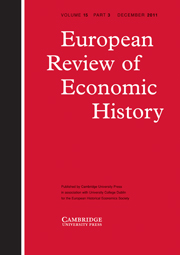Crossref Citations
This article has been cited by the following publications. This list is generated based on data provided by Crossref.
Hale, Matthew
Hawkins, Richard
and
Wright, Catherine
2009.
List of publications on the economic and social history of Great Britain and Ireland published in 2008.
The Economic History Review,
Vol. 62,
Issue. 4,
p.
953.
Clark, Gregory
2010.
Was There Ever a Ruling Class? A Proposal for the study of 800 Years of Social Mobility.
Investigaciones de Historia Económica,
Vol. 6,
Issue. 17,
p.
11.
PRATT, DAVID
SCHOFIELD, P. R.
HEALEY, JONATHAN
KIRBY, PETER
BRADLEY, KATE
TAYLOR, JAMES
and
BROWNLOW, GRAHAM
2010.
Review of periodical literature published in 2008.
The Economic History Review,
Vol. 63,
Issue. 1,
p.
187.
Boberg-Fazlic, Nina
Sharp, Paul Richard
and
Weisdorf, Jacob Louis
2011.
Survival of the Richest? Social Status, Fertility, and Social Mobility in England 1541-1824.
SSRN Electronic Journal,
Lyons, John S.
2011.
The audacity of Clark: A review essay.
The Journal of Socio-Economics,
Vol. 40,
Issue. 1,
p.
98.
Boberg-Fazlic, N.
Sharp, P.
and
Weisdorf, J.
2011.
Survival of the richest? Social status, fertility and social mobility in England 1541-1824.
European Review of Economic History,
Vol. 15,
Issue. 3,
p.
365.
2013.
Escaping poverty.
p.
439.
Grumbach, Jacob M.
2019.
Billionaires, Organizations, and Federalism: Developments in the Study of American Inequality.
The Journal of Politics,
Vol. 81,
Issue. 4,
p.
e73.
Alfani, Guido
2020.
Pandemics and Asymmetric Shocks: Evidence from the History of Plague in Europe and the Mediterranean.
Journal for the History of Environment and Society,
Vol. 5,
Issue. ,
p.
197.
Jensen, Peter Sandholt
Pedersen, Maja Uhre
Radu, Cristina Victoria
and
Sharp, Paul Richard
2022.
Arresting the Sword of Damocles: The transition to the post-Malthusian era in Denmark.
Explorations in Economic History,
Vol. 84,
Issue. ,
p.
101437.


